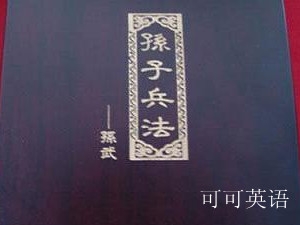兵勢篇 NO.4:
紛紛紜紜,斗亂而不可亂;
渾渾沌沌,形圓而不可敗。
亂生于治,怯生于勇,弱生于強(qiáng)。
治亂,數(shù)也;勇怯,勢也;強(qiáng)弱,形也。
這句啥意思:
湍旗紛紛,人馬紜紜,雙方混戰(zhàn),戰(zhàn)場上事態(tài)萬端,但自己的指揮、組織、陣腳不能亂;
混混沌噸,迷迷蒙蒙,兩軍攪作一團(tuán),但勝利在我把握之中。
雙方交戰(zhàn),一方之亂,是因?yàn)閷Ψ街诬姼鼑?yán)整:一方怯懦,是因?yàn)閷Ψ礁赂遥灰环饺跣。且驗(yàn)閷Ψ礁鼜?qiáng)大。
軍隊(duì)治理有序或者混亂,在于其組織編制;士兵勇敢或者膽怯,在于部隊(duì)所營造的態(tài)勢和聲勢;軍力強(qiáng)大或者弱小,在于部隊(duì)日常訓(xùn)練所造就的內(nèi)在實(shí)力。
英文這么說:
Amid the turmoil and tumult of battle, there may be seeming disorder and yet no real disorder at all;
amid confusion and chaos, your array may be without head or tail, yet it will be proof against defeat.
Simulated disorder postulates perfect discipline,simulated fear postulates courage; simulated weakness postulates strength.
Hiding order beneath the cloak of disorder is simply a question of subdivision; concealing courage under a show of timidity presupposes a fund of latent energy;masking strength with weakness is to be effected
by tactical dispositions.












